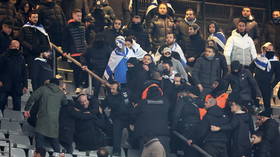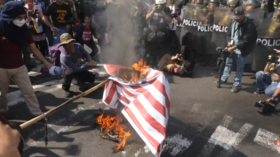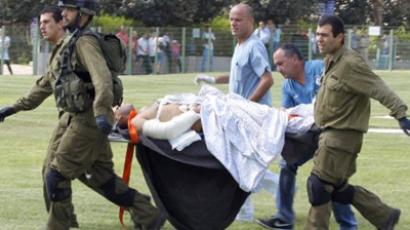Gaza war over, battle for reparations continues
It has been three years since Gaza was pounded by a relentless Israeli bombing and invasion that lasted 22 days. The offensive killed almost 1,500 Palestinians, with many families being wiped out. For many, the battle has now shifted to the courts.
Saleh Abu Hajaj is unusual – not because he laid a claim against the Israelis, but because he won. Victory, though, is bittersweet.“I’m a broken man. The Israelis say their army has morals. Which morals are they talking about?” he questions.It was December 2008. For three weeks Israeli soldiers bombed the Gaza Strip, killing nearly 1,500 Palestinians – four out of five were civilians. At the same time, hundreds of rockets fell on southern Israel, killing three Israeli civilians.“I couldn’t get to my home for 16 days, because the Israeli soldiers were firing all the time,” Saleh Abu Hajaj told RT. “As soon as they left, I went there and inside. On the walls, the soldiers had written ‘You’ll find the bodies 50 meters away.’ I found the body of my mother, buried in the sand, and the body of my sister, Majda, covered with some bricks.”Saleh took his case to the Palestinian Center for Human Rights. In a precedent-setting move they secured an out-court settlement with the Israeli military.It took Saleh two weeks before he could retrieve the bodies of his mother and sister because of continued fighting in the area. The Israeli military said this made the case exceptional and justified reparation.Saleh received just under US$150,000 compensation.“If someone loses his leg or hand, or is killed or injured, all the money in the world is not enough. But what we are fighting for here is a financial compensation that will offer some relief,” says Mohammed Bseso, a lawyer at the Palestinian Center for Human Rights.The Palestinian Center for Human rights has more than 200 cases like Saleh’s on its books. But the heavy paperwork, bureaucracy and expenses discourages many others from coming forward.Salah Talala al-Samouni, however, is a rare exception. He filed a claim three years ago – and is still awaiting a response today.“It was early morning. There was shelling and the apartment above was on fire,” he explains. “I went outside with my hands in the air – the soldiers told me to pull off my shirt and trousers. I did what they said, but they fired a rocket. I looked behind me – my mother had been blown apart. I identified her from her ears. My two-year-old daughter, my father, my aunt, my cousin, my whole family was killed in that moment.”But convincing Israeli authorities that compensation is due can be a major obstacle.“If it’s an act of war, and usually military operations are, according to the Israeli case law, are perceived as acts of war, then the state is exempt from liability,” says Fatmeh el-Ajou, a lawyer who represents Gaza families suing for loss of relatives during the war.Whether Saleh Abu Hajaj’s case will help other Palestinians is not yet clear. The Israeli army has also said it has opened an investigation into what happened, but so far no indictment against any Israeli soldier has been filed.














